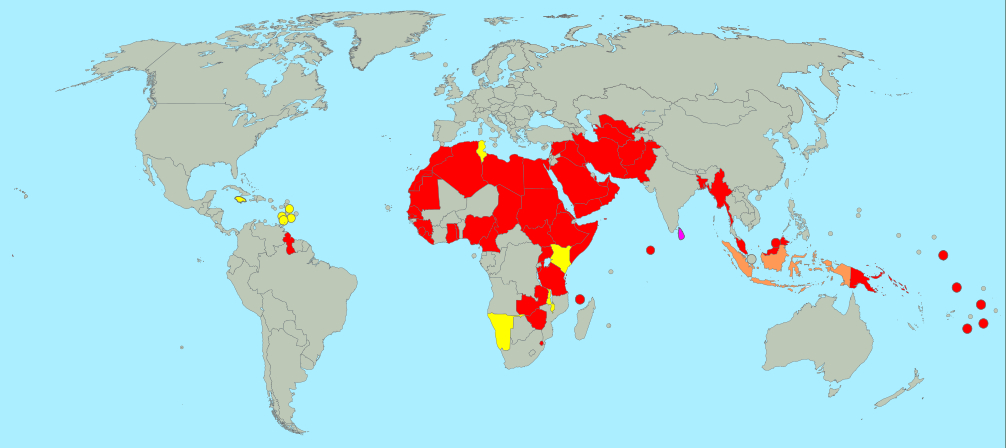
Map of the 66 countries where sexual relations between people of the same sex are illegal. YELLOW countries have anti-LGBTQ laws that are currently being challenged before local courts. Sri Lanka, in PINK, currently has a bill before its parliament to repeal its sodomy law. Indonesia, in ORANGE, has laws that criminalize homosexuality only in some subnational jurisdictions. All states in RED have nationwide sodomy laws and no known efforts to remove them.
Legal challenges to anti-LGBTQ laws are under way in Africa and in the Caribbean. In the map above, which shows the 66 nations with anti-homosexuality laws, the nations with active legal challenges that could decriminalize homosexuality there are shown in yellow.
AFRICAN NATIONS
The Human Dignity Trust, which is active in challenging anti-LGBTQ laws, maintains a comprehensive country-by-country accountof the status of anti-homosexuality laws (and gently encouraged Erasing 76 Crimes to update its world map.)
in Tunisia in December 2021, Human Dignity Trust reports, a case was filed in the Court of Cassation, “the nation’s highest court”, challenging the criminalisation of same-sex sexual activity under Article 230.
In 2022, the LGBT rights group Shams reported, the Court of Cassation issued an opinion that the country’s anti-homosexuality law is unconstitutional. However, Shams stated, the law will remain on the books unless it is overturned by Tunisia’s Constitutional Court. In the meantime, any defendants charged under Article 230 can cite the opinion from the Court of Cassation in their defense, Shams stated.
In Kenya in 2016, the non-governmenetal National Gay and Lesbian Human Rights Commission (NGLHRC) launched a constitutional challenge to Kenya’s anti-homosexuality laws. In 2019, the High Court rejected that challenge. The NGLHRC appealed that decision and is currently awaiting action from Kenya’s Court of Appeal.
In Malawi, a Dutch NGO worker and a local transgender woman are challenging the country’s anti-homosexuality law. After they argued their case in July and August, a judgment is currently awaited.
In Namibia, in 2022, Friedel Dausab, a gay Namibian man, filed a challenge to the common law offence of sodomy and related offences, on the basis that they were incompatible with his rights as protected by the Constitution of Namibia. Dausab, an expert in HIV prevention and treatment and an experienced LGBT rights activist, brought the case with the support of the Human Dignity Trust. A ruling is still awaited from the High Court of Namibia.
In Uganda, human rights activists are challenging the nation’s extreme new Anti-Homosexuality Act in Uganda’s Constitutional Court. The run-up to the law and its enactment in May have triggered extensive anti-LGBTQ violence and human rights abuses. The latest constitutional challenge does not affect a longstanding and seldom enforced Ugandan anti-homosexuality law. (The existence of that law is the reason for the red color of Uganda on the map above, rather than yellow.)
CARIBBEAN NATIONS
The sodomy laws of four small Caribbean island nations are being challenged in the Eastern Caribbean Supreme Court. Those countries are Grenada, Saint Lucia, Saint Vincent & the Grenadines, and Dominica. A decision in the case was expected earlier this year.
In addition, lawyer/activist Maurice Tomlinson is challenging the anti-buggery law in his native Jamaica — an effort that has been slowed down by extensive legal maneuvering from powerful Jamaican homophobes. The Inter-American Commission on Human Rights ruled in late 2020 that Jamica’s sodomy laws contravene the American Convention on Human Rights, but so far that has not persuaded the Jamaican government to act.
Source: African Human Rights Media Network member Erasing 76 Crimes.
COMMENTS